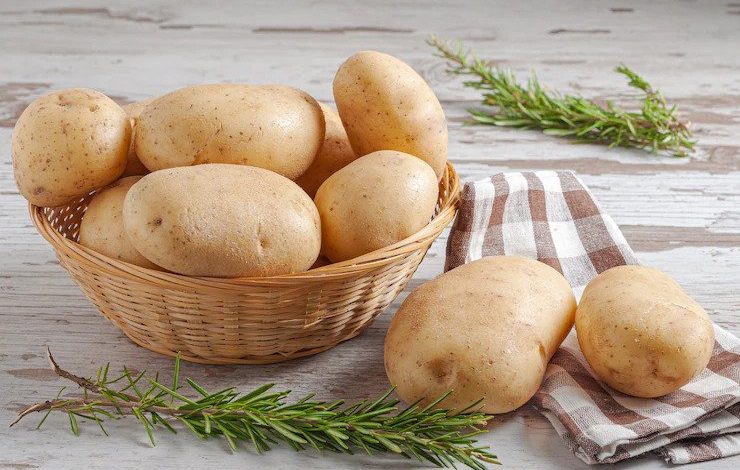How is potato best for building muscle?

There’s no one-size-fits-all answer to this query as it is base on various factors, such as the kind of protein and the individual’s diet requirements and objectives. But, in general, the potato-derived protein appears to be an appropriate alternative to milk-based proteins for creating muscles.
For instance, one study examined the effects of potato and whey protein on muscle growth in trained resistance males. After 8 weeks of exercise, both groups had similar gains in strength and muscle mass.
Similarly, another study showed that when individuals consumed a potato protein supplement after exercising, they saw similar increases in strength and muscle mass to those who consumed a whey protein supplement. For male impotency problem you can take Cenforce 100 and Fildena 100 tablet.
To better understand and obtain a satisfactory answer to our primary question, it is important to understand the main distinctions between milk and potato protein.
Comparison of the protein from milk and potato
Let’s start with the following characteristics.
Composition
The protein from potatoes is less high in fat, calories and carbohydrate than milk protein. It’s also fantastic calcium, iron, phosphorus, and potassium source. Milk protein, however, is a full protein, which means it has all the amino acids that our bodies require.
The way they’re processed
Potato protein is normally made from starch in potatoes. Milk protein is usually isolated from casein from milk or whey.
Biological value
The protein’s biochemical value (BV) measures how much our bodies can utilize it. Protein from potatoes has a biological value of 80, and milk protein has a high BV of 94. This means that our bodies will use the milk protein we take in more than we do the protein from potatoes.
Amino acid profile
Potato protein is less abundant in cysteine, amino acid and methionine than milk protein. It is, however, higher in the amino acids Lysine. Lysine is the essential amino acid the body cannot produce on its own, so we have to obtain it through our diet.
Useful for vegans
Vegetarians can use protein from potatoes, but milk protein is not.
While potatoes are often associated with unhealthy greasy foods, they can be quite healthy and helpful for those on a vegan diet.
Here are some of the benefits of potatoes for vegans:
1. Potatoes are a good source of complex carbs.
2. They are also a good source of fibre.
3. It contains various vitamins and minerals, including potassium, magnesium, and vitamin C.
4. Potatoes can help you feel fuller for longer due to their high starch content.
5. They are relatively low in calories.
6. This can be cooked in various ways, making them a versatile food.
7. They are affordable and easy to find.
8. Potatoes can be a good source of protein for vegans if paired with other plant-based proteins like beans or lentils. 9. It can be use as a vegan replacement for meat or dairy in many recipes.
10. They are a filling and satisfying food that can be enjoy as part of a healthy vegan diet.
It prevents all Disease
Yes, the humble potato can be quite helpful in disease prevention. But did you know that it can also help with weight loss, heart health, and blood pressure? Here are some ways this common vegetable can keep you healthy: The potato is a good source of fibre, which can help to keep your digestive system healthy and prevent constipation.
It is also a good source of potassium, essential for healthy heart function. Potatoes are low in calories and fat, making them a good choice for those trying to lose weight. And finally, potatoes’ high water content can help keep your blood pressure in check. So, next time you’re looking for a healthy way to improve your health, reach for the potatoes!
Muscle mass building and proteins
Proteins are the nutrient that our bodies use to build new muscles. If you’re looking to build muscle, it is important to consume sufficient protein. What amount of protein do you require?
How much protein you require depends on many aspects, including your age, level of activity and goals for building muscle. It is estimated that the Recommended diet allowance (RDA) in protein levels is 0.36 grams/pound of body weight which is 0.8 grams for every kilogram.
This is equivalent to:
- 56 grams daily for a typical sedentary man
- 46 grams daily for the average woman who is sedentary
- 71-88 grams daily for active men
- 56-75 grams daily for active women
If your weight is 150 pounds (68 kg), you’ll need to consume 54g of protein daily. However, if you’re trying to increase muscle mass, you may require more. A study, for instance, revealed that people who consumed 0.55 grams of protein for every pound of mass (1.2 grams per kilogram) added more muscle than those who consumed 0.45 grams of protein for every pound of total body mass (0.99 grams per kilogram).
The most effective way to ensure you’re getting enough protein is by eating diverse protein-rich meals during your day. The best protein sources are fish, meat, poultry, eggs, dairy products, legumes, and nuts.
Conclusion
According to the nature of the protein, its biochemical processing value, the amino acid profile, and its suitability for vegetarians, potato protein is believe to be a good replacement for dairy protein in creating muscles. But it is important to remember that every person’s needs and goals are different, and it is recommended to talk with a register dietitian or a certified sports nutritionist to find the most suitable protein source for you.
